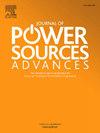A comprehensive review and analysis of technology performance characteristics of lithium-ion battery cell manufacturing: Introducing a Call-for-Innovation-Heatmap
IF 4.6
Q2 CHEMISTRY, PHYSICAL
引用次数: 0
Abstract
The Lithium-Ion Battery is attributed an enabling role for achieving climate policy goals by accelerating the shift of the mobility sector to renewable energy usage and improving renewable energy integration into the energy infrastructure through stationary storage. Thus, challenges related to further optimization of battery technology and its production that need to be tackled to achieve the set goals are manifold. Effective research funding planning is needed to efficiently use resources for advancing cell technologies and its production. However, despite being essential for identifying and prioritizing innovation needs based on technological performance, we perceive that an overview on how current issues in battery cell production hold for impact on a holistic operation site perspective is lacking. Thus, we aim at developing comprehensive process overview specifications for state-of-the-art lithium-ion battery cell production by applying a systematic, methodical approach as well as to derive critical problems and opportunities for targeted innovations application. We contribute to scientific literature by linking process streams and operational innovations in battery cell manufacturing to production management literature. Our findings furthermore have implications for both public research and industrial managers providing guidance on prioritizing development projects aiming at process management efficiency in battery cell manufacturing.
锂离子电池制造技术性能特征的综合回顾与分析:引入创新呼吁热图
锂离子电池通过加速移动部门向可再生能源使用的转变,并通过固定存储改善可再生能源与能源基础设施的整合,在实现气候政策目标方面发挥了推动作用。因此,进一步优化电池技术及其生产需要解决的挑战是多方面的,以实现既定目标。有效的研究经费规划需要有效地利用资源来推进细胞技术及其生产。然而,尽管在技术性能的基础上识别和优先考虑创新需求是必不可少的,但我们认为,缺乏对电池生产中当前问题对整体运营现场影响的概述。因此,我们的目标是通过应用系统、有条不紊的方法,为最先进的锂离子电池生产开发全面的工艺概述规范,并为有针对性的创新应用得出关键问题和机会。我们通过将电池制造的工艺流程和操作创新与生产管理文献联系起来,为科学文献做出贡献。此外,我们的研究结果对公共研究和工业管理者都有启示,为电池制造过程管理效率的优先开发项目提供指导。
本文章由计算机程序翻译,如有差异,请以英文原文为准。
求助全文
约1分钟内获得全文
求助全文

 求助内容:
求助内容: 应助结果提醒方式:
应助结果提醒方式:


